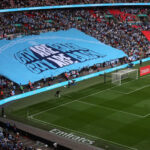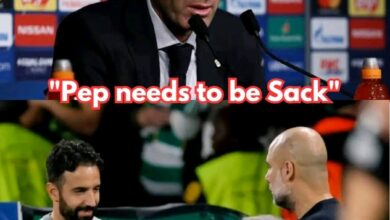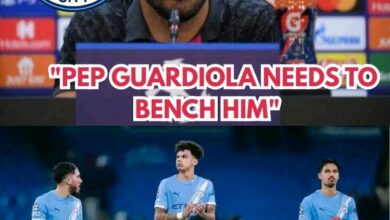Manchester City’s Fixture Conundrum: The Complex Web of Football Scheduling

In the high-stakes world of English football, where success means competing on multiple fronts, fixture congestion has become an increasingly contentious issue. Manchester City, perennial contenders across all competitions, now find themselves embroiled in yet another scheduling controversy as they prepare for their third consecutive FA Cup final appearance. This latest episode highlights the growing complexity of football’s crowded calendar and the competing interests that shape it.
Three in a Row: City’s Return to Wembley
Manchester City secured their place in this year’s FA Cup final with a hard-fought victory over Nottingham Forest last weekend, continuing their late-season resurgence and keeping their trophy hopes alive in what has been a challenging campaign by their lofty standards. The triumph sets up an intriguing final against Crystal Palace on May 17th, returning to the scene where they experienced both jubilation and heartbreak in previous finals against Manchester United.
This achievement comes amid a period of transition for the FA Cup itself. England’s most prestigious cup competition underwent significant revamping last year, with organizers implementing several changes designed to both elevate the tournament’s prominence and acknowledge the demanding schedule faced by clubs competing in European competitions.
Most notably, the FA eliminated replays entirely — a radical departure from tradition that had already been gradually phased out in later rounds. The fifth round was restored to its weekend slot after five years as a midweek fixture, and perhaps most significantly, the final was allocated its own exclusive day in the calendar, scheduled for the weekend before the Premier League season’s conclusion, with no competing top-flight fixtures permitted on the same Saturday.
“These changes represent a modern approach to preserving the FA Cup’s heritage while recognizing the realities of today’s football landscape,” explained an FA spokesperson when the modifications were announced. “By giving the final its own dedicated spotlight, we’re ensuring this historic competition receives the attention it deserves.”
When Theory Meets Reality: The Scheduling Dilemma
The FA’s vision for a streamlined, more prominent cup competition seemed straightforward in theory. In practice, however, the intricacies of coordinating multiple competitions, broadcasting requirements, and the interests of various stakeholders have created a tangled web of scheduling conflicts — with Manchester City caught squarely in the middle.
The first complication arose from one of the FA’s own new regulations: the prohibition of Premier League fixtures on the Friday night before the FA Cup final, intended to maximize attention on the showpiece event. However, this rule has already been breached, with Sky Sports scheduling a high-profile clash between Chelsea and Manchester United at Stamford Bridge for Friday, May 16th.
The decision wasn’t made lightly or without justification. Both Chelsea and Manchester United will also be involved in the women’s FA Cup final, scheduled for Sunday, May 18th. Moving the men’s Premier League fixture to Friday allows supporters of both clubs to attend both matches without conflict — a rational accommodation that nevertheless undermines the FA’s attempts to create a clean runway for the men’s final.
“It’s a sensible solution to an unusual circumstance,” noted football scheduling expert Daniel Wright. “But it does highlight how difficult it is to create rigid rules in a sporting landscape with so many overlapping competitions and considerations.”
For Manchester City and their supporters, this fixture adjustment means sharing some of the pre-final spotlight with a high-profile Premier League clash between two traditional rivals. While City manager Pep Guardiola has always maintained that his team focuses solely on their own preparation, the dilution of attention represents a subtle erosion of the competition’s prestige.
The Ripple Effect: Tottenham’s Europa League Conundrum
The scheduling challenges extend beyond the direct participants in the FA Cup final. Tottenham Hotspur, currently competing in the Europa League semi-finals, have reportedly requested that their Premier League fixture against Aston Villa be moved forward from Sunday to accommodate their potential appearance in the Europa League final just three days later.
With both Friday and Saturday unavailable due to the FA Cup final restrictions, Spurs had hoped to play on the preceding Thursday. According to multiple sources, Villa have rejected this proposal, pointing to their own experience of managing Champions League commitments throughout the season without special accommodation.
“There’s no established precedent for such a move,” a Villa spokesperson reportedly stated. “We’ve been juggling Premier League and Champions League fixtures all season with the standard recovery time. That’s simply part of competing at the highest level.”
This stance seems reasonable on its face, but the situation is complicated by the FA Cup final rules eliminating what would otherwise be a logical Saturday kick-off for the Spurs-Villa game. The ripple effects of the FA Cup’s elevated status thus extend well beyond the participating teams, creating friction between clubs with different priorities and competition commitments.
Tottenham manager Julian Davis expressed his frustration in a recent press conference: “We’re committed to representing English football at the highest level in Europe, but the current scheduling makes that unnecessarily difficult. A little flexibility would benefit everyone.”
The Eurovision Factor: An Unexpected Competitor
Perhaps the most surprising element in this fixture puzzle involves an entirely different form of competition altogether: the Eurovision Song Contest. According to industry insiders, the BBC is advocating for a 3pm kick-off time for the FA Cup final to accommodate their broadcast of Eurovision later that evening.
This potential timing represents a significant departure from recent trends. Apart from the last two Manchester derby finals — classified as “high risk” events by police and therefore given earlier start times — FA Cup finals have typically kicked off at 5:15pm since 2012. This later time slot has been favored by broadcasters to maximize viewership both domestically and internationally.
“The 5:15pm kick-off time has become something of a modern tradition for the FA Cup final,” explained media analyst Sarah Thompson. “It captures the maximum audience across multiple time zones and gives the event a prime-time feel. Moving back to 3pm because of Eurovision would be quite a statement about the changing hierarchy of cultural events.”
For broadcasters, the decision involves complex calculations about potential audience figures, advertising revenue, and production logistics. For football purists, however, the mere suggestion that the pinnacle of the English football season might be shifted to accommodate a singing competition represents a troubling erosion of the sport’s cultural standing.
“There was a time when everything else would work around the FA Cup final, not the other way around,” lamented former FA Cup winner and pundit Mark Lawrenson. “It says something about modern priorities when even this historic occasion has to compete for attention.”
The Fan Perspective: Practical Challenges
While media executives and football administrators debate optimal broadcast windows, Manchester City supporters face very real practical concerns regarding the final’s timing. With the last direct train from London Euston to Manchester Piccadilly departing at 9:01pm, a 5:15pm kick-off would leave traveling fans with a tight window to make their way from Wembley to central London after the match — particularly if the contest extends to extra time and penalties.
“It’s another example of how the match-going fan often seems to be the last consideration in these decisions,” said Kevin Parker, general secretary of the Manchester City Supporters Club. “For those of us who’ve followed the team through thick and thin, getting stranded in London after the biggest game of the season would be a bitter end regardless of the result.”
Parker estimates that he has personally spent over £6,000 attending City’s Wembley appearances in recent years, emphasizing the financial commitment made by dedicated supporters. “When you factor in tickets, travel, accommodation, and everything else, following your team to Wembley has become incredibly expensive. The least we should expect is a schedule that makes it logistically possible.”
From this perspective, the potential 3pm kick-off driven by Eurovision considerations might actually benefit City fans, providing a more comfortable time frame for the post-match journey home. This alignment of broadcaster and supporter interests represents a rare moment of convergence in a discussion typically characterized by competing priorities.
The Broader Context: A Crowded Calendar
Manchester City’s fixture challenges cannot be viewed in isolation. They represent just one manifestation of football’s increasingly congested calendar, a problem exacerbated by the expansion of multiple competitions and the financial imperatives of modern football.
The 2024/25 season has seen the implementation of new formats for both the Champions League and Europa League, adding fixtures to an already packed schedule. The FIFA Club World Cup continues to evolve, with an expanded tournament planned for the coming years. Domestic cup competitions fight to maintain their relevance amid this crowded landscape, while international football demands its own windows throughout the calendar.
“There simply aren’t enough dates in the year to comfortably accommodate all the football that various stakeholders want to schedule,” observed players’ union representative Michael Bennett. “Something eventually has to give, and increasingly it’s the welfare of players and the experience of supporters that suffers.”
For top clubs like Manchester City, success brings the “reward” of more matches, creating a cycle that tests the physical limits of players and the logistical capabilities of club operations. Manager Pep Guardiola has been vocal about these challenges throughout his tenure.
“We love to compete, but we need to be sensible about how many games we ask these athletes to play,” Guardiola stated earlier this season. “When you add travel, recovery, and preparation time, the demands have reached an unsustainable level.”
Looking Forward: Potential Solutions
As Manchester City prepare for their FA Cup final against Crystal Palace amid this complex backdrop of competing interests, the broader question remains: how can football create a more coherent, sustainable approach to fixture scheduling?
Several potential solutions have been proposed:
Enhanced coordination between governing bodies: The FA, Premier League, UEFA, and FIFA could establish a more collaborative approach to calendar planning, with regular forums to address conflicts before they arise.
Player-centered scheduling: Implementing mandatory rest periods and maximum game thresholds to protect player welfare and, by extension, the quality of the spectacle.
Supporter impact assessments: Requiring organizers to formally consider the practical implications for match-going fans when setting kick-off times and fixture dates.
Technology-assisted planning: Utilizing advanced algorithms to optimize fixture scheduling across multiple competitions, accounting for factors like travel distances, recovery time, and broadcast requirements.
Competition prioritization: Making difficult decisions about which tournaments take precedence in cases of unavoidable conflict, perhaps with clearer hierarchies established in advance.
“The current approach of trying to squeeze ever more football into the same calendar while attempting to protect the primacy of multiple competitions simultaneously is simply unsustainable,” concluded sporting director and former player Richard Dunne. “What we’re seeing with Manchester City’s FA Cup final situation is just one symptom of a much larger problem that the football world needs to address collectively.”
The Immediate Challenge
For now, Manchester City’s focus remains on the immediate task: preparing for their FA Cup final against Crystal Palace while navigating the final rounds of the Premier League season. The exact kick-off time remains to be confirmed, with the FA expected to make an announcement in the coming days.
Whether the final begins at 3pm to accommodate Eurovision or holds the now-traditional 5:15pm slot, City will be aiming for their second FA Cup triumph in three years. For supporters planning their Wembley journey, the uncertainty adds yet another layer of complexity to an already challenging situation.
“We’ll be there whatever time they decide,” said long-time City fan Margaret Williams. “But it would be nice to know that the people making these decisions understand what it means for those of us who follow our team week in, week out.”
As football continues to evolve in the modern era, finding the right balance between commercial imperatives, competitive integrity, and the fan experience remains perhaps the sport’s greatest challenge. Manchester City’s latest fixture conundrum serves as a microcosm of this ongoing struggle — a reminder that for all the glory and excitement of elite football, the foundations of the sport still rest on practical matters of when, where, and how the games are played.
In that sense, the humble fixture list becomes not just an administrative necessity but a powerful statement about values, priorities, and the future direction of the beautiful game















